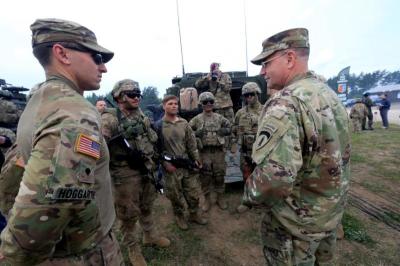Faith and brokenness in the military — Meeting at the intersection

This Veterans Day, we owe it to our armed service members to ask why it is that the number of those dead from suicide more than quadruples the number of those killed in the line of duty. And what can we do to intercede for those who struggle with mental health issues?
According to findings from 2021, in the post-9/11 wars in Iraq, Afghanistan and elsewhere, it is estimated that over 30,000 U.S. service members and veterans died as a result of suicide.
This staggering number is more than four times the number of troops killed in combat during the same 20-year time period. Sadly, during peacetime, that number has and is expected to continue to increase as veterans and active duty military internalize the demands of their jobs, impacting their bodies and souls.
These statistics outpace those of the general American population who die by suicide. I served six years in the Army and am a veteran of Operation Iraqi Freedom, and I have experienced the deep pain of losing someone close to me to suicide.
While mental health care is improving in our nation and the stigma surrounding seeking help for mental health concerns is lessening, we still have a long way to go. There remains a great need for compassion and community to help lift the burdens of service members suffering from depression, anxiety, and isolation.
Even if a soldier never sees combat, life in the military is not for the faint of heart. The mental and emotional toll increases as service members deal with unique challenges like deployments, long and demanding work days that put a strain on families, and housing allowances that struggle to keep up with the pace of inflation. However, I believe that the biggest obstacle to overcome in the military is a pervasive sense of isolation. While serving, military members face persistent loneliness due to constant moves, deployments, and separation from their spouses and families.
After their service is completed, a recent study noted that “The transition from active duty to civilian life…and difficulty forming connections with the general population upon separation from service worsens social isolation and loneliness.” Veterans struggle to find the structure and regimen they had in the military, and have trouble “explaining their military experience to others, which may hinder the ability to form connections.”
I submit that there is a place that exists that can offer solace and peace to members of the military, regardless of their background, rank or current challenges. While viewed by some as a relic, millions of Americans still hold a high view of the community found in their local church. The church can provide people with something the rest of the world cannot: Hope.
That is because local churches proclaim a message of hope and help people build stronger relationships with God and with one another. Researchers—regardless of their faith background—agree that church is beneficial to mental health due to ritual, fellowship, and yes, community.
A local church is also a place to belong—something that is especially meaningful in military communities where the population is largely transient due to deployments and reassignments. As a military veteran and now a local church pastor, I’ve seen firsthand the impact that a local church in a military community can have when they intentionally reach and embrace the service members around them, many of whom live off base.
There is so much that can be done for the families of active duty service members. A wife or husband essentially becomes a single parent while their spouse is deployed. The toll it can take on marriages when one spouse returns from witnessing unspeakable violence and has to return to civilian life can feel insurmountable. Support, compassion and care can be provided by church communities during this time.
Shortly before exiting the military, I chose to pursue full-time ministry. In addition to my role as a local church pastor, I now serve as the director of development for Send Network’s support to churches planting churches in military communities. Since 2010, Send Network has helped churches start more than 10,000 new churches in cities across North America, including military communities. These churches give hope to men and women in uniform by introducing them to the gospel and caring for them through the hardships that come with a military lifestyle.
This Veterans Day, ask yourself what you or your local church can do to support the men and women who carry heavy burdens in order to protect our freedoms. Consider partnering with your local church or Send Network so that we can continue to reach those who have sacrificed so much for our country so that no service member will feel isolated or beyond hope.
Jared Huntley is the pastor of Pillar Church of San Antonio, located outside Lackland Air Force Base, and the director of development for Send Network's effort to plant churches in military communities.




























